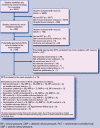Self-monitoring and other non-pharmacological interventions to improve the management of hypertension in primary care: a systematic review
- PMID: 21144192
- PMCID: PMC2991764
- DOI: 10.3399/bjgp10X544113
Self-monitoring and other non-pharmacological interventions to improve the management of hypertension in primary care: a systematic review
Abstract
Background: Patients with high blood pressure (hypertension) in the community frequently fail to meet treatment goals: a condition labelled as 'uncontrolled' hypertension. The optimal way to organise and deliver care to hypertensive patients has not been clearly identified.
Aim: To determine the effectiveness of interventions to improve control of blood pressure in patients with hypertension.
Design of study: Systematic review of randomised controlled trials.
Setting: Primary and ambulatory care.
Method: Interventions were categorised as following: self-monitoring; educational interventions directed to the patient; educational interventions directed to the health professional; health professional- (nurse or pharmacist) led care; organisational interventions that aimed to improve the delivery of care; and appointment reminder systems. Outcomes assessed were mean systolic and diastolic blood pressure, control of blood pressure and proportion of patients followed up at clinic.
Results: Seventy-two RCTs met the inclusion criteria. The trials showed a wide variety of methodological quality. Self-monitoring was associated with net reductions in systolic blood pressure (weighted mean difference [WMD] -2.5 mmHg, 95%CI = -3.7 to -1.3 mmHg) and diastolic blood pressure (WMD -1.8 mmHg, 95%CI = -2.4 to -1.2 mmHg). An organised system of regular review allied to vigorous antihypertensive drug therapy was shown to reduce blood pressure and all-cause mortality in a single large randomised controlled trial.
Conclusion: Antihypertensive drug therapy should be implemented by means of a vigorous stepped care approach when patients do not reach target blood pressure levels. Self-monitoring is a useful adjunct to care while reminder systems and nurse/pharmacist -led care require further evaluation.
Figures
References
-
- Prospective Studies Collaboration. Age-specific relevance of usual blood pressure to vascular mortality: a meta-analysis of individual data for one million adults in 61 prospective studies. Lancet. 2002;360(9349):1903–1913. - PubMed
-
- Chobanian AV. Control of hypertension – an important national priority. N Engl J Med. 2001;345(7):534–535. - PubMed
-
- Burnier M. Blood pressure control and the implementation of guidelines in clinical practice: can we fill the gap? J Hypertens. 2002;20(7):1251–1253. - PubMed
-
- Wilber JA, Barrow JG. Hypertension: a community problem. Am J Med. 1972;52(5):653–663. - PubMed
Publication types
MeSH terms
Substances
LinkOut - more resources
Full Text Sources
Medical
Research Materials
Miscellaneous

